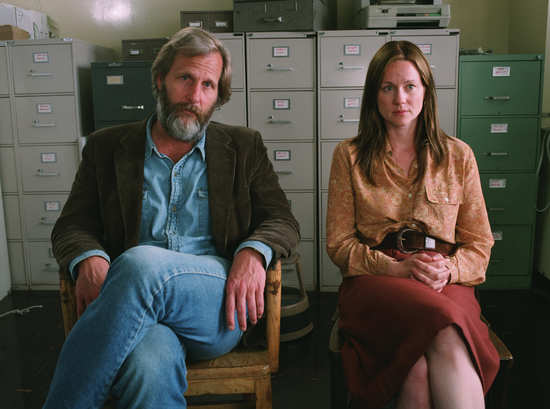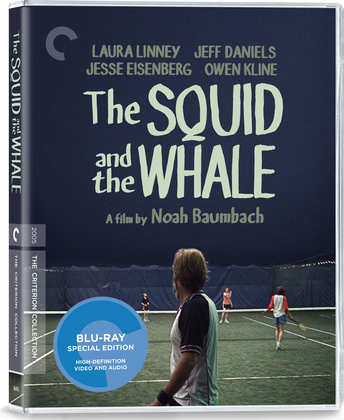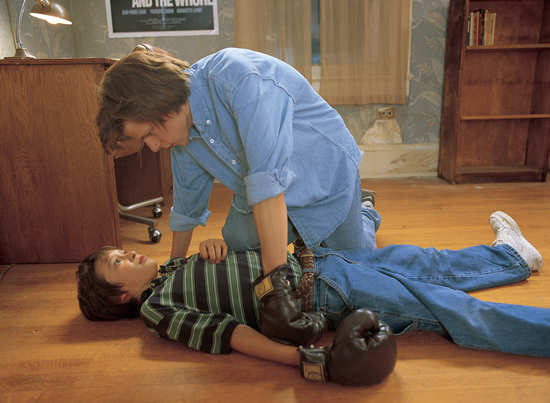Review for The Squid and the Whale
Writer-director Noah Baumbach's 2005 low-budget independent, The Squid and the Whale, is unquestionably a family melodrama though, far from being formulaic and schmaltzy, it offers up a subtly nuanced drama that makes the whole film punch way beyond its weight.
Shot on 16mm in non-studio locations around New York, often without the aid of a tripod and usually in long unedited takes (to save stock costs), it uses this very disadvantage to enhance its documentary style, adding to the realism and emotional punch.
On paper. It actually sounds like a drag and I’m surprised (and delighted) that it somehow managed to find an appreciative audience despite this. Because it so decisively did, Criterion have done of the decent thing and given it the love and attention that previous issues just never did. That means that the transfer is as good as you could expect it to be (it was only 16mm to start with) and the contextual features are well worth watching too.
Baumbach was and is a buddy and colleague of Wes Anderson (they did film school together I think and Baumbach has written for him). Anderson helped raise the finance for ‘Squid and the Whale’ and helped with some of the pre-production. There are some similarities with Anderson’s work here, particularly thematically with the heavy autobiographical elements and the New York context. So comparisons between the two are inevitable though a bit unfair. Baumbach’s ‘Squid’ was made for a fraction of the cost of Anderson’s ‘The Royal Tenenbaums’ for example.
Apparently, Baumbach wanted to capture something of his own youth and, in particular, the separation and divorce of his own parents through the film. In the film, the over-bearing and controlling father, Bernard Bergman (Jeff Daniels), is shown to be an academic writer, dining out on some modest early success which seems to have never been followed through. Whilst Daniels does an incredible job in his portrayal, he never descends to ham and the complexity of such a character is allowed to take full form. Whilst he is undeniably an asshole most the time, he is also allowed to show an occasional fun side and even hints of empathy which never quite materialise.
He is completely over-bearing to his wife Joan (Laura Linney) who is also an academic and who has become, out of necessity, the principle breadwinner of the family – clearly resented by the failing father. The fact that she too is a writer just about kills him and sends his sneering superiority into overload.
It’s clear that the marriage is on the rocks and is unravelling before our very eyes, much to the despair of the two children, the older brother, Walt (Jesse Eisenberg), and Frank (Owen Kline).
It’s not long until the pair are choosing sides. Walt hero worships his Dad, in a way believing the hype, and is seen using his Dad’s quotes to impress the ladies, talking about literature he has never read and using his Dad’s remarks about Dickens and Kafka to impress. It’s toe-curling viewing as he claims ‘Great Expectations’ is one of Dickens' lesser works and describing Kafka’s ‘Metamorphosis’ as ‘Kafkaesque’. Things come to a head when he later wins a school talent competition by passing off Pink Floyd’s Roger Waters’ song, ‘Hey You’, as his own. Where we see the ill effects of his Father’s influence most is in his almost schizophrenic treatment of his girlfriend, Sophie (Halley Feiffe). When he forgets his father’s influence he is genuinely respectful and warm, but when he takes on his father’s persona he becomes mean and judgemental – often cruel.
Frank, on the other hand, sympathises with his Mother and starts rejecting his Dad before seemingly coming right off the rails. At just 13 years old he has started drinking and is caught masturbating in the school library – all a clear cry for help.
If it sounds a bit intense, well, it is, but never so much that you’ll find it hard going. It’s an easy film to watch, flowing from one scene to the next, like watching a car crash in slow motion.
The acting throughout is very naturalistic and Jeff Daniels in particular turns in a stunning performance. He wasn’t anywhere close to a first choice and it’s hard to understand why he was so willing to take a punt on so slight an independent film, all shot on a shoe-string.
Image quality is probably as good as it’s going to get for 16mm transfer and its presented in its original aspect ratio of 1.85:1. There is a DTS-HD MA 5.1 audio track too which is fine as far as it goes (some of the ambient street sounds can be heard in the rear speakers with dialogue up front but that’s about as wild as it gets). The choice of music in the film is great (in common with friend Wes Anderson’s films) including ‘The Swimming Song’ by Loudon Wainwright III on the end credits, and the sublime use of the strings in Lou Reed’s ‘Street Hassle’ for the film’s finale.
As this is a Criterion release, the extra features definitelyreflect the ‘film school in a box’ ethos. Here’s what you get.
Noah Baumbach (30 mins approx.) – Baumbach is very candid about how close ‘The Squid and The Whale’ is to be autobiographical. It’s an incredibly personal film to him and explains why he was prepared tp put so much energy and effort into the project without any major financial backing. In truth, this very fact probably helped ensure that the film remained truly independent and he was able to realise his vision creatively, albeit with crushing financial constraints. This interview brings all this to light, as well as the frustrations in how long it took to raise the finance he eventually got (over three years).
Revisiting The Squid and The Whale (20 mins approx.) – Interviews with Linney, Kline and Eisenberg talking about their roles and their relative lack of acting experience at the time.
Jeff Daniels (8 mins approx.) – An interview Daniels where he talks about how hard he fought to get the role. As always, amusing and illuminating.
Auditions
'Walt and Frank' Auditions for the two actors rehearsing the scene where they discuss the books in Bernard’s new (old) house.
'Do You Like Frank Kafka?' Eisenberg and Feiffer rehearsing the scene where they discuss Kafka; toe-curling but hilarious.
'Not an Intellectual' Rehearsing the scene where Walt presses Sophie about her previous relationship experiences.
'Don't Be Difficult' Eisenberg and Feiffer rehearse their big fall-out on the street.
'I Know It’s Over' Eisenberg and Feiffer rehearse their breakup scene.
Dean Wareham And Britta Phillips (14 mins approx.) A really enjoyable interview based piece which traces the on-going professional relationship between Baumbach and the two composers, with particular focus on this film.
Behind ‘The Squid and The Whale’ (10 mins approx..) More interviews where the actors talk about their roles.
Trailers (4 mins approx.)
Whilst ‘The Squid & the Whale’ may not sound all that great on paper (films about marital break-up can be a harrowing watch), this is a film you’ll definitely want to see. It’s perfectly formed, running almost like a documentary and although it will almost certainly make you squirm in places, it will stick with you for many days after viewing. This release is unarguably the definitive one to date so if you don’t yet have it in your collection, you know what to do. Highly recommended.



Your Opinions and Comments
Be the first to post a comment!